Translations 677
Humor, Parody and Other Tricks vs. Patriarchy

Humor, Parody and Other Tricks vs. Patriarchy
Analyses of how women writers and artists describe to the public the continued danger posed in the 21st century by machismo, violence against women, sexual harassment, rape, and even femicide . These have been the focus of a Colloquium at Casa de las Americas (February 17-21) convened by its Women’s Studies Program, created in 1994 and now directed by Dr. Luisa Campuzano.
By Mireya Castañeda
February 23, 2020
Translated and edited by Walter Lippmann for CubaNews.
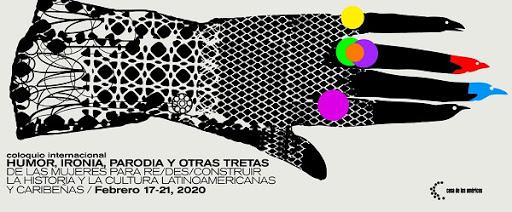
Photo: Taken from the Internet
From literature, theater and cinema, women have decided to expose with weapons as powerful as humor and satire that terrible anachronism that responds to the generic name of patriarchy.
The analysis of how women writers and artists describe to the public the continued danger represented in the 21st century by machismo, violence against women, sexual harassment, rape, and even femicide has been the central theme of a Colloquium at Casa de las Americas (February 17-21) convened by its Women’s Studies Program, created in 1994 and today directed by Dr. Luisa Campuzano.
Under the suggestive and even sarcastic title Humor, irony, parody and other women’s tricks to re/des/construct Latin American and Caribbean history and culture, the Colloquium attracted nearly forty specialists from universities in Canada, the United States, Mexico, Puerto Rico, Chile, Italy, Poland, Portugal and twenty from Cuba.
For our publication, Dr. Campuzano said that the Colloquium was very rich in participation and reiterated that “there is nothing like humor, like parody, irony, to remove anachronistic, ridiculous, and laughable patriarchal prejudices and that battle takes place within literature, the arts, and the theater.
The panels dealt with specific contents such as De cuerpo entero: las décimas y las canciones de Violeta Parra; Las muchachas se diverten. History and political discourse in the Latin American fiction film directed by women, or Women’s humour in political and social cabaret.
Two Cuban examples to appreciate how this serious subject is ironically treated from the stage: the monologue Yaisú by the also narrator Laidi Fernández de Juan performed by Verónica Feria, and a fragment of the piece La cita signed and performed by Andrea Doimeadiós and Verónica Feria.
But in addition to the “tricks” with which Latin American and Caribbean writers and artists put sexism and machismo in check, the Colloquium heard their impact even on many penal codes, including that of Cuba according to one of the presentations, in need of a reform that is planned for 2021 on the island.
The participants are aware of the urgent need to transcend public spaces, a debate of society in general about gender violence, sexual harassment and even cyber-bullying, beyond literature, the performing arts, and academia.
We Don’t Give Up Touching the Stars

Though the Path May be Challenging,
We Don’t Give Up Touching the Stars
Eight million Cubans gave their support to what is, since last February 24, the Supreme Law of our society, protected by Martí’s dream of a Republic of exceptional humanism.
February 23, 2020
Translated and edited by Walter Lippmann for CubaNews.
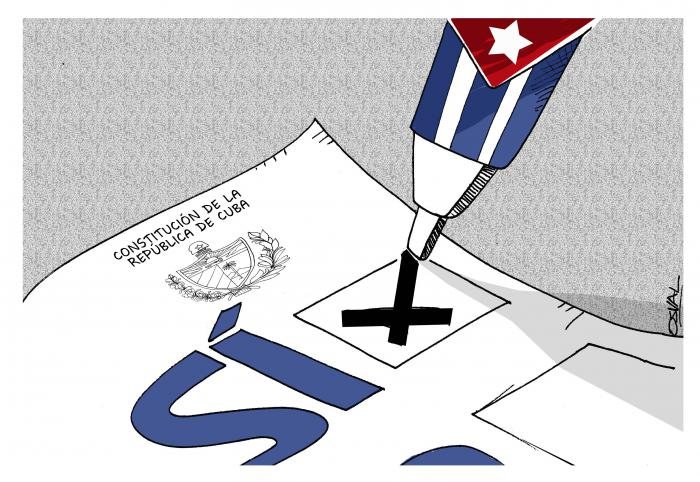
A year has already passed, and if it were necessary to define it in one word, there is no other more explicit word for it than “transcendental”. Twelve months of incessant work since, having once again the dream that Martí left us of a Republic of exceptional humanism as a shelter, more than eight million Cubans gave their support to what is, since last February 24, the Supreme Law of Cuban society.
The approval of a more advanced constitutional text was not only reliable proof of the continuity that has marked the evolution of our revolutionary process, but also the starting point for an intense and challenging work stage.
The Guidelines, the Development Plan until 2030 and the Conceptualization of the Cuban economic and social model showed us that the Cuba of these times was demanding transformations to make our social system more sustainable, developed, proactive and, therefore, more just and richer in opportunities. For that, a new Constitution was undoubtedly necessary.
However, the collective consensus for the structuring of the Magna Carta, its approval in a referendum and its proclamation on another historic date, April 10, laid out a path, directed in two essential directions. First, the approval of a whole legal and regulatory framework that would allow for the implementation of its content. Second, on the one hand, the reordering of the structures of the State and the Government, so that they are more functional, efficient and objective in pursuit of a supreme goal: the growth of our country on all fronts.
These have been, during this year, unrenounceable goals, sustained with discipline and order, on a par with the permanent confrontation with the sickly policy of the United States Government against Cuba, and the countless tensions arising from it.
The essential task of legislating
During 2019, the Cuban Parliament has had an intense legislative year. Several laws have already been approved by our deputies, in accordance with the provisions of the Constitution itself, and in view of the need to regulate certain processes that are indispensable from the social and economic point of view.
During the first ordinary session following the proclamation of the new Magna Carta, three of these invaluable legislative texts came into being: Act 127 or the Electoral Act, Act 128 or the Act on the National Symbols of the Republic of Cuba, and Act 129 or the Fisheries Act, the latter of which was passed for the first time in Cuba.
Logically, our current Magna Carta includes important changes in the constitutional order. Its first transitory provision determines that within six months after its entry into force, a new Electoral Law had to be approved by the National Assembly, of course, in order to first guarantee the structuring of the Electoral Councils at all levels and the subsequent election of the new figures described in the constitutional text, and which therefore did not correspond to what was regulated in the previous law of October 29, 1992. Likewise, it includes, as is logical, the procedures for the election of already known figures such as deputies, delegates to the Municipal Assemblies of People’s Power and the direction of these.
For its part, the Law on National Symbols will make it possible, as it explains, to resolve the problems manifested in the regulations in force until then. At the same time, it makes the use of these symbols more flexible to a certain extent, in accordance with the interests of Cuban citizens.
In the case of the Fishing Law, its second Por Cuanto makes clear “the objective of establishing the management of fishing resources under the principles of conservation, sustainable use, the precautionary approach, the implementation of scientific-technological criteria and the protection of ecosystems, in correspondence with national and international norms and the principles of food security and sovereignty so that in a progressive, flexible and effective manner, the implementation of the Cuban fishing policy is guaranteed.
By the end of 2019, in its last ordinary session, the National Assembly approved two new laws, which are essential in the process of improving the bodies of the People’s Power: The Law on the Organization and Functioning of the Municipal Assemblies and the People’s Councils, and the Law on the Organization and Functioning of that body and the Council of State, as the structure that represents it between one session and the next.
Ahead lies an arduous task of legislation, the complexity of which is reflected in the timetable approved for that purpose, with a total of 70 regulations between laws and decree-laws up to 2023, and another 24 from that year until 2028. All of them, without a doubt, are aimed at the optimum organic functioning of the Cuban nation.
Structures more functional and tempered at the present time
The first month of the year brought with it two closely related processes that contribute not only to strengthening the structures of the State, but also to achieving a greater level of protagonism of the territories in decision-making, the search for local solutions to problems, the transit towards more horizontal processes that involve reasoning and assuming strategies in accordance with the closest reality, as well as in the advance towards municipal autonomy.
First, the delegates to the municipal assemblies of People’s Power throughout the country elected the Governors and Vice-Governors in their respective provinces. Later, they also approved, at the proposal of their presidents, those who already hold the posts of Quartermasters. Each one of these figures, with attributions gathered within the Magna Carta.
However, this step was preceded by others, which involved changes at the highest levels of leadership in the country and in the National Assembly of People’s Power (ANPP) itself, the highest governing body of the State, which elected from among its members its President, Vice President and Secretary, who are in turn members of the Council of State.
The essential reason for this decision is that the Council of State is the body that represents the anpp in the inter-sessional periods and is accountable to the anpp for its activities. Although it has the power to adopt decree-laws, which may be essential for the conduct of certain processes in the country, these must be ratified by the National Assembly at its next session. Its powers are clearly defined in the Constitution.
This body is also responsible for the election of the President and Vice-President of the Republic. The former is elected from among its members, with an absolute majority vote, for a period of five years, and is also accountable to it. The second, elected in the same way, fulfils the powers delegated or designated by the President.
The Cuban Magna Carta clearly defines the structure of the Government of the Republic, constituted by the Council of Ministers as the highest executive and administrative body. It is headed by another of the new figures identified in the constitutional text: the Prime Minister. This, in turn, is the Head of the Government of the Republic. The latter was appointed on the proposal of the President of the Republic, with the support of the absolute majority of our deputies.
Beyond the constitutional terms
Although this text offers a brief summary of the different steps that have been completed as part of the materialization of constitutional budgets, the true essence of each of them and their impact within society goes much further than the legal language or the terms that make up a document of the rank of a Constitution.
The reality is that everything achieved so far, and what is still on the table, which is not at all negligible, has an unquestionable protagonist: the people, and with that profound popular essence it has been executed. Let us never forget that the deputies represent even the most humble of Cubans, those who live in the most intricate area, those who are still very young or those who are already combing their hair.
Nor should we forget that the fact that we approved the Magna Carta in a constitutional referendum, and that we enriched it with our criteria, in a broad popular consultation, also means that the majority supports the processes arising from its chapters and sections.
This has been, above all, a year of learning, of understanding that transformation is a top principle in order to develop, grow and broaden the horizons to which we aspire. Everything we do together, with that conviction of “thinking as a country”, is reverted to the benefit of you, me, our family, the people we love and who are privileged to live on this Island.
Our Apostle showed us from the infinite greatness of his person and the undeniable depth of his word, that one does not climb the stars on flat roads, and from that wisdom we interpret, therefore, that if the engine that moves us is will, no matter how rough the road, it is not impossible to reach them, with the accurate guidance of our leaders.
Bernie Sanders, the Most likely Democrat Bet in America Against Trump

Bernie Sanders, the Most likely Democrat in America Against Trump
Senator Bernie Sanders is shaping up today to be the Democrats’ most likely bet to face President Donald Trump in the November 2020 election
February 23, 2020
Translated and edited by Walter Lippmann for CubaNews.
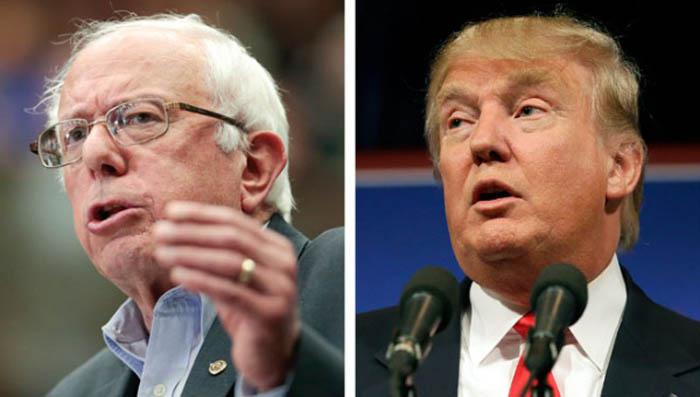
From left to right, Democrat Bernie Sanders and Republican Donal Trump. Photo: EFE
If weeks ago the media highlighted the figure of the former mayor of New York and multimillionaire Michael Bloomberg as an alternative to the “establishment” and moderate Democrats to confront President Donald Trump, today the figure of the senator is making its way as a representative of diversity in the country.
His successes in the early states gave him a clear path to a plurality of committed convention delegates, while his rivals are divided and attempts to reach a contested convention appear to be going in the wrong direction, according to various U.S. media.
As with Donald Trump in 2016, so it is Sanders so far in 2020. The characters are different, but the same dynamic is at play.
The reality facing those in the so-called blue party who do not want the senator from Vermont to run is the division in their ranks. This makes it extremely difficult to stop a candidate if no alternative can be agreed upon, whether it is former vice president Joseph Biden, Bloomberg or another of those still competing.
According to analyses in such influential media as The New York Times and The Hill, the race is young and there is still time for “conservatives who opposed Trump to offer some advice to Democrats who want to nominate someone other than the Vermont socialist,” says the Times.
After the pointer’s passage through the blue ranks, the idea is now underway that figures like fellow challenger Amy Klobuchar, former Mayor Pete Buttigieg and even former Vice President Biden, if he loses in South Carolina, will drop from the race to give possibilities to alternative figures like Bloomberg or Senator Elizabeth Warren.
According to Ross Douthat, author of several books such as “The Decadent Society,” those who are against Sanders are not united, but that could happen if moderate alternatives such as Bloomberg or Biden are considered, since it is difficult to stop a candidate from the Sanders plurality at a contested convention.
The Democrats’ delegate distribution rules make a contested convention more likely, but Sanders is on track to get a clear plurality of delegates by the end of March, and one thing that would be critical is whether he arrives in May with a majority of delegates.
The chances of the new frontrunner gaining more support are real. Some analysts, such as the site www.fivethirtyeight.com, even consider his pace to be overwhelming and he will arrive at the party convention with a large margin in his favor to be the nominee who will face Donald Trump on November 3 for the presidency.
The diversity of the vote in the race will determine what happens on Super Tuesday. That could consolidate Sanders, because on March 3 there are two delegate awards, in California (495) and Texas (261), and there Latinos can have the last word.
In the race to win the nomination in July, contestants are trying to make it to the party convention with the support of 1,991 delegates needed out of the total of 4,750 to be their party’s nominee for the November presidential election.
As things are going, Sanders could get there with that number. The race, however, is still in its infancy and a showdown between Sanders and Biden, or even Bloomberg, for the nomination is not ruled out, although Sanders probably has the advantage.
In Bloomberg’s case, Super Tuesday is still ahead when he will start appearing on the ballot, but after his disastrous performance in last Wednesday’s debate in Nevada, his chances are in doubt.
According to the polls, Sanders leads in both California and Texas. The progressive senator could also take advantage of those advantages in the next few days, after his momentum in the first states where they voted so far.
The reality is that the existence of eight candidates now makes it difficult for any rival to reach the top and challenge Sanders, which is likely to increase the pressure on some under-performing candidates to withdraw.
The truth is that there is panic among opponents and pressure for an alternative to Sanders is on, so eyes are on the Super Tuesday results, when the Democratic competition to challenge Trump will definitely be closed or opened.
(Source: Prensa Latina)
The Autobiography of Malcolm X
The Autobiography of Malcolm X
The Autobiography of Malcolm X, in an edition complete with nearly 100 additional pages of excerpts from his speeches, was first published in a Cuban edition in 1977. The book has remained in print through the subsequent years. It’s sold at a price Cubans can afford: ten pesos. The following is the introduction to the Cuban edition by journalist Juana Carrasco, written for the 1977 edition and still used in the current edition. Juana Carrasco remains active in Cuba today, both as a columnist for Juventud Rebelde, and as a regular participant in Cuba’s leading public affairs program, the Mesa Redonda (Round Table). We are pleased to bring this introduction to the English-speaking public for the first time. (2005) The author of this prologue is STILL active covering the United States for Juventud Rebelde. (2020)
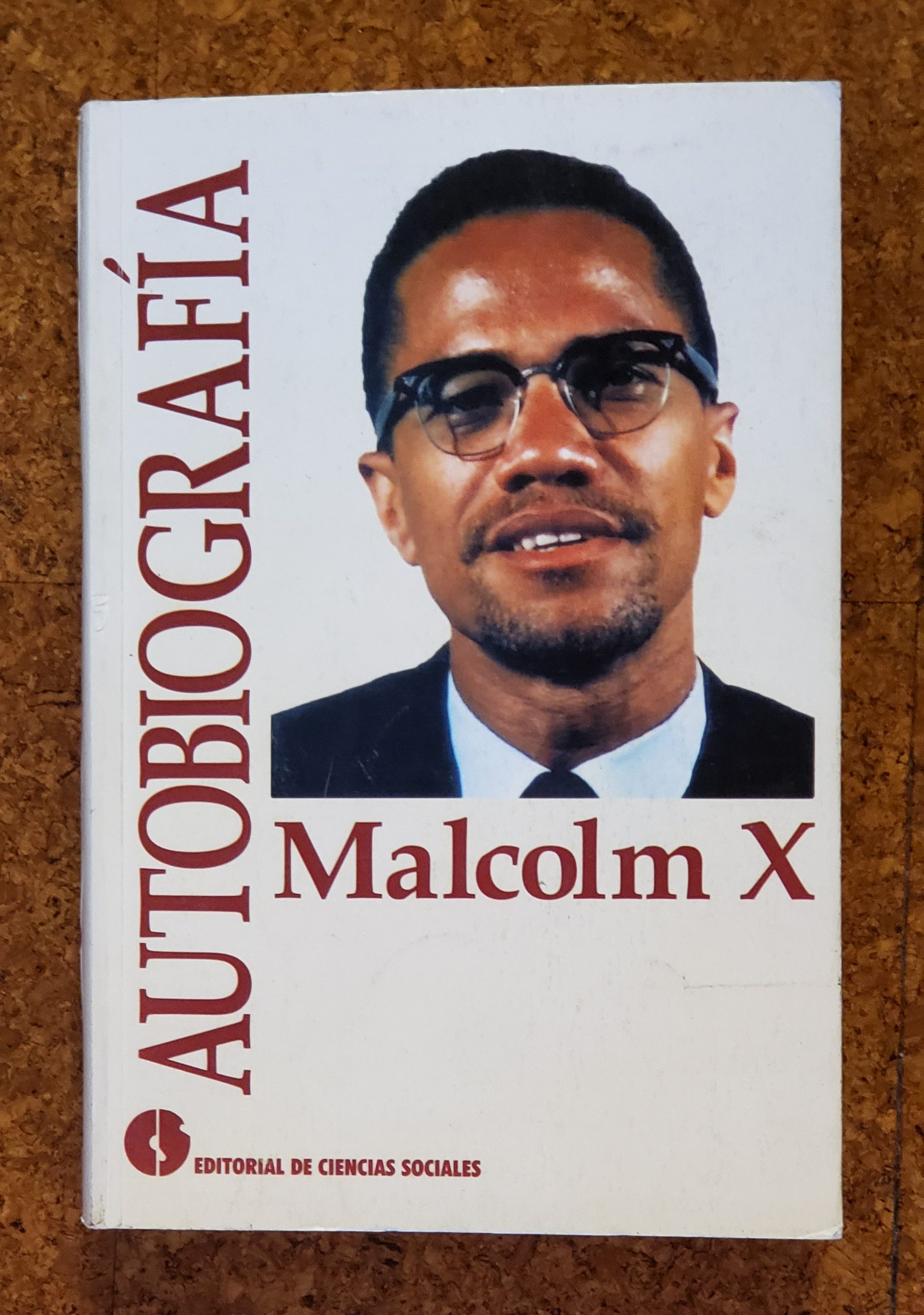
Editorial de Ciencias Sociales publication, Havana, 1977
Instituto Cubano del Libro, Editorial de Ciencias Sociales
ISBN 959-06-0539-7
A CubaNews translation by Ana Portela.
Edited by Walter Lippmann for CubaNews
PROLOGUE TO THE CUBAN EDITION
“I don’t expect to live long enough to read my book…”, he said one day and it proved to be true because he was killed before his autobiography was published. It became a dramatic reality, on the afternoon of February 21, 1965, when he began to address an audience of about 400 Blacks and half a dozen whites.
Two men, taking advantage of a confusion caused by their accomplices, jumped from the first row of the Audubon Ballroom and fired at Malcolm X who kept standing in the face of the assassin’s bullets and then he fell to the floor – mortally wounded – while one of the killers emptied his gun into his body.
Betty Shabazz, the wife of Malcolm X and his four little children were present in the Audubon . Betty ran towards the lectern screaming: “They have killed my husband! They are killing my husband!”
At 3:45 in the afternoon, in the Columbian Presbyterian Medical Center, the following report was made: “The gentleman you know as Malcolm X is dead.”
The reaction of the whites, headed by the press, was to identify the assassins and the reason for the assassination as an act of vengeance by other Blacks, the Black Muslims, belonging to the organization Malcolm X had left during the early part of 1964.
However, the reaction in the Black ghettoes and among the closest followers of Malcolm X, his killing had a very different reason. Gradually it became known that powerful forces had their hands in it: the Department of State and the Central Intelligence Agency (CIA) were involved in the assassination because they were alarmed by the growing impact of Malcolm X and, primarily, because of his intent to internationalize the racial discrimination existing in the United States, trying to take it to the UN Human Rights Commission, through diplomats of African countries.
Using fraudulent declarations from bogus or bought witnesses, a trial was fabricated against two members of the Black nationalist organization, the Black Muslims [the Nation of Islam]; they intended to demonstrate that the assassination had been a question “among Blacks” and the investigations which should have been made of the events were not performed.
Because, in truth, it became evident that the Muslims could not have carried out the actions that were ongoing occurrences against Malcolm X: intervention and wire-tapping of all his telephone calls, following him on his trips to Europe, Africa and the Middle East; and these are just a few.
Proof revealed later demonstrates that the assassins were acting under orders of the United States government. Gene Roberts, one of the men who should have protected the life of Malcolm X, was a member of BOSS (Bureau of Special Services) an organization of highly secret police agents. [BOSS was, in fact, a covert arm of the New York Police Department.] In 1964 he had infiltrated the Organization of Afro-American Unity (OAAU), the organization founded by Malcolm X.
Malcolm X was killed when Gene Roberts was supposed to protect him. And the majority of the OAAU members are now imprisoned or dead. Gene Roberts later infiltrated another black nationalist organization, the Revolutionary Action Movement [RAM] and a group known as the Mau Mau. He culminated his activities against the most radical Black organizations, the Harlem Branch of the Black Panther Party. His testimony and provocations served to jail 21 Black Panthers in New York who were in danger of being sentenced to long prison terms, accused of conspiring to blow up stores of the great city. Gene Roberts was, at last, exposed in 1970.
One day we will learn the precise role he played in the assassination of Malcolm X.
The events of 1965 demonstrated that Malcolm X was right when he told his wife Betty that the United States establishment was after his life.
For this reason the New York Times wrote, in December of 1965: “Most admirers of Malcolm are beginning to believe that he was assassinated by order of the United States government.”
But who was this man considered to be a danger to the government of the United States, to the powers that be?
Malcolm Little, because that was the surname he received from his father on May 19, 1925, was born in Omaha, Nebraska. In the great cities of the North, in the ghettoes where he lived most of his life, from the age of 15, he was a thief, drug addict, professional gambler and pimp. Simply, he touched bottom of human conditions to become, later, the dynamic leader of the Black revolution in the United States. His example was devastating, consequently his dangerousness.
“I have dedicated all the time available to this book because I believe and hope that my honest and factual account will serve an objective reader and find some social value in this testimony.
“I hope and expect that an objective leader, reading about my life – the life of a Black leader formed in the ghetto – acquires an image and clearer account of the Black ghettoes that are modeling the lives of twenty-two million Blacks who live in the United States”.
Now, Malcolm X is known in the entire world by the surname he took when he left the Charlestown prison in 1952 and became a Black Muslim. In this Black Nationalist movement he was revealed as a genius in oratory winning thousands of converts. But, at the same time, he became a symbol of freedom and independence for ghetto Blacks. Continuing the process, he became politically aware. That was what led him to the religion of the Black Muslims. Malcolm X studied the oppression and discrimination of his Black brothers and, in 1963, began to have doubts about the religion he supported. Clear political differences caused him to break from the organization, on March 22, 1964.
In his autobiography, dictated to the Black journalist, Alex Haley, he reveals a stereotypical image of the Black assimilated to white culture until, in jail and through the doctrine of Islam, he became a sensitive being, proud of his black skin, of his frizzed hair; he identified with his African origin and with the pain of his people. He is politicized and he assumes the ideology of a revolutionary, he becomes a MAN.
“It would probably be impossible to find a Black man, in any part of the United States, who had sunken so low in human society, as me; or a Negro who has been more ignorant or a Negro who has suffered so much anguish in life than I. But it is only after the deepest darkness when the greatest joy can rise up; only after slavery and prison can he accept the sweet acknowledgement of freedom.”
To understand the crisis of identity, alienation, hostility, discrimination, and loneliness of the United States Negro and the reason for his struggle, the autobiography, writings and speeches of Malcolm X should be read.
“I gritted my teeth and tried to pull the sides of the kitchen table together. The comb felt as if it was raking my skin off … and so stupid that I was in rapture because my hair was like that of the whites … This was my first really big step towards self-degradation … I had joined that multitude of Negro men and women in America who are brainwashed into believing that the black people are inferior – and white people “superior” – that they will even violate and mutilate their God-created bodies …|
“I am not going to sit at your table with an empty plate to see you eat and say that I am a diner. If I do not eat what is on that plate, sitting at the table doesn’t make me a diner. Being in the United States does not make me an American. Having been born here does not make us Americans.”
These statements he made were, perhaps, not pleasant to the ears of many whites and some Negroes, but it was the truth of the situation of his people.
A controversial figure in life, activists of the fight for freedom of the Black people now study his writings, his speeches, his autobiography because the current active militancy in the United States has to be found in him. Then, each interprets him in their own way; but there they are, unmoving and, at the same time, with the flexibility of a constant dialectic development of a revolutionary, taken on, put into practice, enriched.
He aroused laughter and applause because he not only told the Black masses what they wanted to hear for a long time, but because he said it as one of the most eloquent and brilliant political orators of his time.
“I don’t see any American dream. I see an American nightmare.” The bitterness, hostility, animosity of white American racial intolerance is there in his autobiography and in his speeches. They are also present in his later political ideas, as the basis of the action program of the Organization of Afro-American Unity, the organization he founded and those ideas are what led to his assassination.
Internationalization is proposed as the struggle for the US Negro people: “And if the twenty two million US Negroes see that our problem is the same as the problem of the peoples who are being oppressed in South Viet Nam, the Congo and Latin America, then – because the oppressed of the world are a majority and not a minority –, we must confront our problems as a majority who can demand and not as a minority who must beg.”
Many have wanted to classify Malcolm X a Black racist because he spoke of Negro nationalism. When Malcolm X speaks of the peoples of Africa, Asia and Latin America he sometimes calls then Negroes. With this term he symbolized the exploited peoples but his position is not reverse racism: “It is wrong to classify the unrest of the Negroes simply as racial conflict of the Blacks against the whites or as a purely American problem. What we see today is, in fact, a worldwide rebellion of the oppressed against the oppressors … the revolution of the Negroes is not a racial revolution.”
To explain his belief that discrimination is a product of a system of social exploitation, he points out: “…all countries that rise up against the claws of colonialism are turning to socialism. I do not think that this is accidental. The majority of the countries that were colonial powers were capitalist countries and, today, the last bulwark of capitalism is the United States. It cannot be believed that a white person can believe in capitalism and not believe in racism. There cannot be capitalism without racism.”
The idea of rethinking the Negro as a man, as a human being, in the highest meaning of this word, and his internationalist concept of the struggle of the American people, makes him hated by imperialism; also his opposition and charges against the war of aggression in Viet Nam, Yankee invasion of Santo Domingo and the sending of mercenary troops to the Congo. But he is even more dangerous because he understood the importance of violence and, with this concept; he opened the eyes of the young American youths. He demonstrated, exhaustively, what revolutionary violence could do in China, in Algeria, in Cuba and is achieving in Viet Nam. He foresaw, at the time, the violence that would shake the Negro ghettoes in the United States and defended it as the necessary means to achieve freedom.
This publication of his autobiography and fragments of his speeches by the Cuban Book Institute informs us that the fight of the American Negro people was symbolized in one of the leaders of most clarity, who, with a direct, simple, plain, incisive and compelling language – because it will be a page-turner. Probably we will have to reread the book – as a piece of history, a history that is still being written with the blood and sweat of the Blacks and exploited of the United States
Juana Carrasco
TRANSLATOR’S COMMENT:
I am what is considered in Cuba a white person although there is a saying that he who hasn’t Congo blood has Carabali (two Black tribal groups that were slaves during colonial times). Also, if you proclaim pure Spanish heritage suffice it to remember that the Moors occupied Spain for five hundred years.
Now, what is the reason for this explanation? I want to express my opinion about Malcolm X that is a difficult task for a “white” person. I was young when Malcolm X held up the banner of Black liberation. (About 5 years older than him) and I followed his teachings at every opportunity I could find. He was a truly electrifying orator. But most important of all, I realized that I was seeing a new young leader who would be a force to consider in the near future.
I was greatly impressed by his thinking and became completely convinced when he left Elijah Muhammad to stand on his own, in defense of the exploited of the world. His trips to the many countries of the world opened his eyes to widespread exploitation and the ills of imperialism but also made him a world leader in his own right.
This was something that the “establishment” could not and would not allow and consequently, the US government and its agencies plotted his assassination.
Like Che, Malcolm became a martyr of the class struggle and a symbol of freedom. As a person politically developed during the sixties, I believe that both were necessary in life: Che to the Cuban people, Malcolm to the oppressed Blacks and both to the exploited of the world.
We have lost two champions but their seeds are sown and are beginning to bear fruit.
So with strong conviction I can say:
Power to the Blacks and exploited of this world!
Socialismo o Muerte!
Venceremos!
Ana Portela
June 2005
Manufactured Gas Service Interruptions

Manufactured Gas Service Interruptions Announced
The Manufactured Gas Company informs its clients that due to work that will be carried out by Energas S.A. at its installation in Puerto Escondido, there will be effects on the service, from 9:00 p.m. on Saturday February 22nd until 3:00 a.m. on Monday February 24th
February 20, 2020
Translated and edited by Walter Lippmann for CubaNews. NOTE: This article refers to gas for home cooking as received through pipes from the street.

They announce interruptions in the service of manufactured gas in the capital from Saturday 22 to Monday 24 February. Photo: Taken from the Internet
The note issued by the entity’s General Management also announces that during this period the gas service to the capital will be partially or totally affected.
State consumers in the territories are advised not to consume gas until this service is normalized, in order to allocate all production to customers in the population sector of the municipalities of Plaza, Cerro, La Habana Vieja, Centro Habana, Diez de Octubre, Playa and Marianao, adds the information note issued.
The execution of these works will allow greater reliability in the distribution of natural gas to the company’s production plants.
The General Direction of Gas Manufacturado Company offered apologies for the inconvenience that this interruption may cause.
(With information from Juventud Rebelde)
Pretexts and Lies Against Syria

Pretexts and Lies Against Syria
March marks the ninth anniversary of the aggression unleashed against this Middle Eastern country, which has been torn apart by many foreign interests
By Elson Concepción Pérez
February 17, 2020
Translated and edited by Walter Lippmann for CubaNews.

People’s forces and the Syrian army celebrate their victory in Hama province. Photo: Hispan TV
Let us put things in place: Syria is an independent and sovereign country, with a democratically elected government, whose program has been directed towards development and social benefits for its people.
It is also part of its status as a sovereign nation that it has the right to sign military agreements with anyone it deems fit. In this case, it is entirely legitimate that it has requested military collaboration from Russia and Iran to defend the country against the terrorism of internal groups and against foreign actions aimed at destabilising the Arab nation.
It has had difficulties and, as in all countries with diverse religious currents, many have been and still are the setbacks in harmonizing its walk in the midst of a region besieged by a foreign power interested in its energy resources.
In this context, it is worth noting that the government of President Bashar al-Assad has made significant economic and social progress in favor of the most dispossessed sectors.
But Syria has become a stumbling block for US policy in the Middle East region and the imperial drive to seize its resources, just as it has done with Iraq and Libya.
A terrorist group called the Islamic State (IS), which many specialists consider to have emerged from the subversion laboratories conceived by the U.S. CIA. IS [ISIS] appeared in the region a little over a decade ago and soon expanded like a bad weed, with a matrix of the most ruthless terrorism.
Together with the EI, a group openly supported by the United States, the Al Nusra Front, a descendant of the shadowy Al Qaeda, established itself on Syrian soil, putting in check its defense system. Moreover, it has suffered and continues to suffer for years from the direct aggression of Israel which has occupied part of the Syrian Golan Heights.
This March marks the ninth anniversary of the war of aggression unleashed against the country. Alarming figures, such as the more than 250,000 dead and more than that number of wounded, as well as the forced displacement and migration of millions of its children fleeing the war and the total or partial destruction of cities, industries, world heritage temples and many other facilities, constitute open wounds that are very difficult to heal.
THE DANGER IS SPREADING
Since last year, the Syrian People’s Army, with the active participation of the Russian aerospace force and Iranian advisers, had defeated terrorist groups in almost 90% of the territory, while the government was demanding the withdrawal of the American military that illegally occupied a part of the country under the assumption of fighting terrorism.
The bombing of areas where the Syrian army was operating, the death of many of its combatants and, in addition, the massacre of hundreds of civilians, including children, with the usual “collateral damage” caused by its bombs, have been part of this reality.
Already almost defeated by the action of the terrorists, those of the Al Nusra Front, supported by Washington, were concentrated in areas near the Turkish border, in the region of Idlib, where there is also the presence of Kurdish groups.
In recent days, on February 12, U.S. military forces opened fire on local residents who gathered near a Syrian Army checkpoint east of the town of Qamishli (Hasaka, Syria) to block the passage of several U.S. military vehicles.
As for the presence of uniformed Turkish soldiers on Syrian soil, the Government of Damascus has characterized it as “a violation of the sovereignty of its territory”.
In recent days, more than a thousand military transports and 5000 Turkish soldiers have crossed the border. Syrian sources accuse the Turkish artillery of having supported the armed terrorist groups’ fighting in Idlib.
As we can see, the current war imposed on Syria may reach a new dimension where, in addition to the internal actors, other external ones are involved, including Turkey in the Idlib border area.
It is quite possible that Trump, in this case, is playing at involving others in a war he has lost, so that he can enjoy his longed-for oil without having to subject his forces to the danger of confrontation.
Not for nothing did the U.S. president, in an interview with Fox News, emphasize once again his administration’s policy of “taking” Syria’s oil.
The Sociological View

The Sociological View
Published: Saturday 22 February 2020 | 09:03:07 pm.

By Graziella Pogolotti
Translated and edited by Walter Lippmann for CubaNews.
Grounded in the Industrial Revolution, with the invention of the steam engine, mass production and the resulting competitive drive to ensure the dominance of the world market had its effects, at an accelerating pace, on the life of society. The soot was invading everything. Cities began to grow rapidly. The proletariat was constituted as a social class. The dizzying change had repercussions on the rise of the social sciences. History changed its perspective, the economy became an indispensable reference point, psychology, anthropology and sociology acquired autonomy. The latter permeated other disciplines with its influence.
With the cost of paper now down, the press has a new reading public. It introduced the soap opera into its pages. It was the antecedent of the current soap opera [telenovela]. With the emergence of creative literary giants, narrative reached an unprecedented peak. First, social romanticism and later the proliferation of “costumbrismo” (local color), the latter spread through the novel, sharpened the sociological outlook. The characters moved in a specific context.
The historical perspective left the past behind to shape the approach of the present. The contradictions in everyday life and the exacerbation of individualism in the struggle to survive, to accumulate power and fortune and to move up the social ladder came to the fore. Little read today, Dickens became a bestseller of that time by showing the drama of helpless childhood in the city environment, captured by crime and victim of the debtors’ prison that punished them along with their parents. Balzac warned about the domination of the financial world, enriched by usury and the consequent disappearance of the small merchant. Emile Zola, A French writer preferred by the cigar factory lectors [workers who read live to cigar workers] wanted to systematize the analysis. He articulated the sequence of his novels to a family genealogy that allowed him to focus each of them on a specific sector of reality.
In one of his novels, Zola examines the seduction exerted on women by the emergence of the first department stores. In accordance with the traditional division of labor, women are responsible for taking care of domestic chores, but they also take on the responsibility of buying what is necessary for the home. Pressed by a concrete need, they turn to the dazzling display case that offers all sorts of temptations. To the purchase of the indispensable, they add the dispensable, with the apparent advantage of having a credit card. Not having to take money out of their purse, they lose track of what they have spent. They fall into debt that, in the end, will be unpayable. It was the original cell of the policy of encouraging consumerism, unleashed more than half a century later, a way of avoiding the overproduction crises characteristic of capitalism through the constant increase in demand, with its depredatory effects on the planet’s goods.
Like history and psychology, sociology became a science. It opened up perspectives that went beyond the field of specialists,. It influenced so-called investigative journalism and can help shape the outlook of better-informed citizens. This approach to reality rethought the complex nature of the link between the individual and society. Considered as a subject of history, human beings build their life expectations from a set of determining factors, among which are class roots, family environment and the education system.
Other factors act on the consciousness of each one, among which the media, entertainment, the use of free time and the formation of paradigms stand out. Some time ago, in the miserable favelas, where the essential was lacking, the television antennas were pointed out. Now, in a similar context, cell phones are everywhere. They offer escape routes, projected towards an illusory world that is not their own. The proposal of models of careers towards individual success replaces the image of a virtuous life in the struggle to transform reality for the benefit of all.
It is often forgotten that among the founders of historical science were Marx and Engels, who put knowledge at the service of the emancipatory revolution. The hegemonic power understood the scope of this way of exploring reality and finding the formulas to intervene in it by operating on human subjectivity. Politics has to strengthen the essential revolutionary condition of the sciences devoted to the study of society, a living and therefore changing phenomenon. It is an urgent demand to calibrate in its right measure the concreteness of the facts, without diluting them in vague generalizations. In the demands of the “wretched of the earth” lies the preservation of the future of humanity. Because once the reserves of the tiny Earth are exhausted, it will have no other planet to inhabit.
Cell Phone Addiction

Cell Phone Addition Causes Loss of Gray Matter in the Brain
Scientists warn that the growing use of smart phones makes it necessary to raise the issue of the harmful effect on mental health
Published February 22, 2020 | 12:46:47 pm.
By Juventud Rebelde digital@juventudrebelde.cu
Translated and edited by Walter Lippmann for CubaNews.

Addiction to social networks, cell phones or video games is often underestimated Author: Twitter Posted: 22/02/2020 | 12:43 pm
BRUSSELS, February 22. – A group of European physiologists have detected negative changes in the volume and activity of the brains of people diagnosed with cell phone addiction.
The researchers scanned the skulls of 22 addicted patients and observed a decrease in gray matter in two regions of their cerebral cortex and less activity in a third region compared to 26 other healthy people.
The observation of this transformation, similar to that which occurs in drug addicts, offers the first material evidence of the relationship between the overuse of so-called smartphones and the physical deterioration of the human brain.
The conclusions of the study will be included in an article that will appear in the journal Addictive Behaviors next June, reports Russia Today. In addition, it was revealed that blue light from digital device screens can accelerate blindness.
The authors stress that the growing use of smart phones in recent years makes it necessary to raise the issue of the harmful effect of their use on physical and mental health.
They are particularly concerned about the health of children, who are spending more and more time with digital devices from younger and younger ages.
In their study, the scientists comparatively analyzed structural and functional magnetic resonance images and used a morphometry based on a voxel, a three-dimensional matrix that served to model brain processes.
This revealed that, compared to the control group, the addicted individuals had a lower volume of grey substance in the left anterior insula of the brain and in two sections of the temporal cortex.
They also recorded lower intrinsic brain activity in the part of the brain that transmits the neural signals between the two hemispheres, the cortex of the right anterior cingulate.
And Yet, It Moves
And Yet It Moves (eppur si muove)

By Manuel E. Yepe
http://manuelyepe.wordpress.com/
Exclusive for the daily POR ESTO! of Merida, Mexico.
February 23, 2020
Translated and edited by Walter Lippmann.
I will take the liberty of dedicating my column in POR ESTO today to transcribe some paragraphs of an article by the Cuban journalist living in the United States, Domingo Amuchástegui. He describes the current state of relations between Washington and Havana, which I consider to be extremely objective in assessing the current situation in Cuba, as well as the Cuban-Yankee dispute.
Its title, “Eppur si muove”, which is very significant, is a phrase attributed to the famous Renaissance astronomer Galileo Galilei when he was facing the Holy Inquisition, clinging to the defense of its truth. Today, Trump is for Cuba something worse than an Inquisition that Cuba challenges by demonstrating its ability to survive.
“Three years of economic warfare on the part of the Trump administration have caused considerable damage to the Cuban economy, not only to the public sector, but also to the private sector and generally to the common people.
“The Trump administration still has an abundant arsenal of possible aggressions and sanctions that, if effective in the coming months, would result in devastating damage”. Among them, Amuchástegui cites the following: the reinstatement of Cuba to its unilateral and arbitrary list of countries that are punishable as terrorists; the total breaking-off of diplomatic relations that are almost non-existent; the suspension of the few remaining commercial flights to Havana; the complete suspension of the sending of remittances by Cubans in the United States; the total suspension of their trips to Cuba; the increase in the number of actions legal and financial sanctions against potential private investors and government cooperation projects from third countries; sanctions against third countries receiving Cuban medical missions and, of course, a naval blockade against merchants, cruise ships and others boats from any country bound for Cuba.”
Amuchástegui points out that the merit of having survived does not diminish in any way the critical situation in which the Cuban economy finds itself, determined to survive in the face of so many excesses, but it must be recognized that the island is experiencing modest advances.
“Cuba closed 2019 with 4.3 million visitors, despite the disappearance of American travelers and cruise ships. There was a 9.3% decrease in total visitors compared to 2018. Canadians, with more than one million tourists, continue to be in first place, and Cuban emigration, which brought 624,000 visitors (88.6% of them living in the US), is in second place.
The latter is distinguished by longer stays than regular tourism. That averages 11.2 days per stay and is the carrier of abundant merchandise and appreciable amounts of cash. These are then channeled into the domestic market through their families and friends. They cover both for stay expenses and investments in small businesses, accommodations in private homes and loan operations to Cuban entrepreneurs for tens of thousands of dollars. This last type of relationship with visitors does not represent any expense for the State’s tourism industry (which entails a net profit) and is the carrier of many remittances that are impossible to calculate due to their informal nature.
Cruise activity has begun to revive with the arrival of European cruise companies along with an increase in airlines, mainly Canadian and European (including Turkey and Russia), organized by a variety of tour operators.
Progress is being made in the creation of a second Special Development Zone in Ariguanabo (the first is Mariel), which will articulate the export capacity of important scientific institutions such as the Center for Genetic Engineering and Biotechnology, the Center for Molecular Engineering, several drug factories, the University of Computer Science and others. The construction of numerous hotels and infrastructures throughout the country is continuing apace.
The presence of foreign capital and its contribution in terms of business management is not only limited to the tourist area. Sherrit (Canada), Imperial Tobacco (UK), Pernod-Ricard (France), Diageo (UK), Unilever (UK-Netherlands), Nestlé (Switzerland), banking operations run by Sociéteé Genérele (Fr), BBVA (ESP) and others have been, and continue to be, important economic partners of Cuba, some of them for decades. This presence has begun to increase since the inauguration of the Special Development Zone in Mariel, with 50 projects underway, 27 of which are now fully operational.
An important British project for the promotion of renewable energies has been completed, represented by the bioelectric plant attached to the Ciro Redondo sugar plant in the province of Ciego de Avila at a cost of 180 million (with financing from China, which continues to be the main source of financing for solar energy projects in Cuba).
February 21, 2020.
ETECSA Warns Against Phone Fraud

ETECSA Warns Against Phone Fraud
The company alerts users to calls of unknown origin, identified many times by 00 and apparently made from abroad
February 19, 2020
Translated and edited by Walter Lippmann for CubaNews.
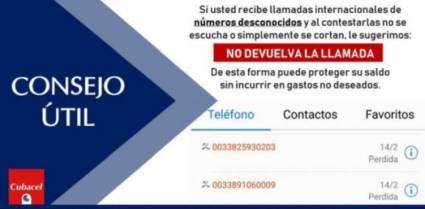
TECSA reiterates to users that they must protect their services from different types of fraud Author: Twitter Published: 19/02/2020 | 09:44 pm
Empresa de Telecomunicaciones de Cuba S. A. (ETECSA) reiterates to users that they must protect their services from those actions, which in different modalities of fraud, can manifest themselves in telecommunications.
The Company warns users that in the event of calls of unknown origin, which are identified mainly by 00, which appear to be from abroad, they will not be answered or returned in order to avoid affecting the balance of the service.
Likewise, passwords or codes are personal information and are not shared. The company will never ask for these data by phone, text or e-mail, so any action of this type will be a deceptive maneuver supplanting the identity of the company.
Likewise, any request for transactions, transfers or advertisements that are excessively attractive, coming from unknown sources, or that are dubious or unreliable, should not be made and thus avoid unwanted damage to your economic interests.
With regard to the computerization of the company, ETECSA systematically disseminates this useful advice in order to guarantee a more secure enjoyment of its services.
Institutional Communication Department
Subscribe to Blog via Email
| M | T | W | T | F | S | S |
|---|---|---|---|---|---|---|
| 1 | ||||||
| 2 | 3 | 4 | 5 | 6 | 7 | 8 |
| 9 | 10 | 11 | 12 | 13 | 14 | 15 |
| 16 | 17 | 18 | 19 | 20 | 21 | 22 |
| 23 | 24 | 25 | 26 | 27 | 28 | |

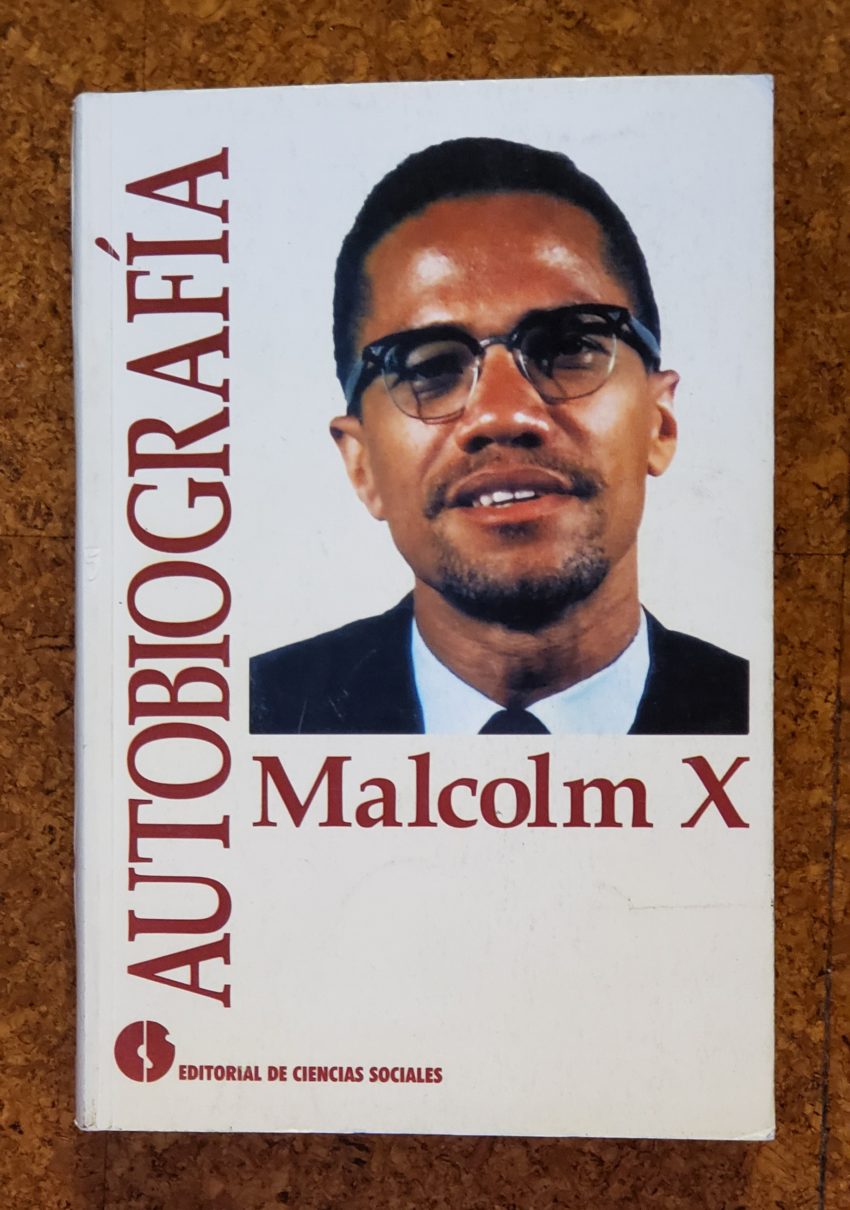


You must be logged in to post a comment.